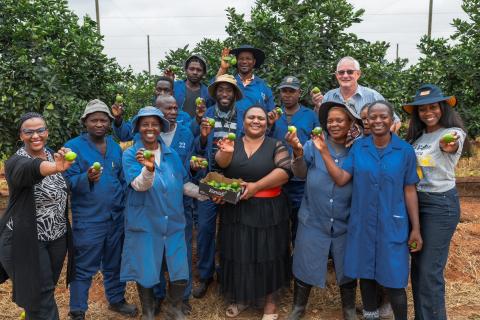
SAB strives to upskill South African youth
South Africa needs more high-level skills development initiatives to address poverty and inequality, says Thandile Bidla, Africa Solutions Product Manager, at South African Breweries (SAB).
According to the South Africa’s most recent list of scarce skills, the country’s workforce lacks the necessary qualifications and skills to meet the demands of the country’s ICT industry; a phenomenon that poses a significant limitation on the country’s long-term economic growth potential. Couple this with the fact that South Africa’s youth unemployment rate is the highest globally, competing with less developed countries which have a lower per capita expenditure of their budget attributed to skills development.
To help combat this issue, South African Breweries (SAB) has introduced an ICT programme to its list of skills development programmes, with the objective of contributing towards the country’s national skills development agenda.
“Skills development has become a critical component of South Africa’s transformation and economic growth. To achieve the scale and sustainability required to address the skills shortage in the country, a more collaborative and concerted effort is required,” Bidla said, referencing the organisation’s skills development efforts, in collaboration with the various SETAs, aimed at ensuring alignment with the National Skills Development Strategy within the food and beverage sector.”
Over the past 15 months, SAB has offered opportunities to more than 90 learners for the ICT programme and the goal is to continue partnering with the Food-Bev SETA and possibly other government programs to continue empowering the South African youth within the ICT sector.
In 2021, which was the first year of the ICT program, the organisation achieved commendable results with 99% program completion, 58% of the learners being women and 60% absorption (full time employment after program was completed. The focus for the 2021 program has been to at least achieve 75% absorption.
SAB has committed to developing a talented and diverse workforce, where the right people are placed in roles that are best suited to their abilities and that provide them with the opportunity to achieve their full potential. As a result, and through its partnerships with the various SETAs – particularly the FoodBev SETA – the organisation has unemployed learner opportunities across most business disciplines.
The Strategy provides a unique opportunity for South Africa to achieve some of its goals towards an integrated education and training system, and that, working together, the country can indeed achieve the skills revolution that its urgently requires. The purpose of the National Skills Development Strategy is to achieve significant increases in qualifications and skills to support priorities and initiatives such as the New Growth Path, the Industrial Policy Action Plan, the Human Resource Development Strategy, and sector development plans. Couple that with the real value added by SETAs, their understanding of labour market issues in their respective industrial and economic sectors.
SAB has committed to developing a talented and diverse workforce, where the right people are placed in roles that are best suited to their abilities and that provide them with the opportunity to achieve their full potential. As a result, and through its partnerships with the various SETAs – particularly the FoodBev SETA – the organisation has unemployed learner opportunities across most business disciplines.
A spokesperson at FoodBev SETA, expressed that more focus should be given to skills development across the food and beverage sector, as this component of empowerment plays a significant role in upskilling South Africa’s young people, to reach higher levels and adequately prepare them for more senior responsibilities.
“Initiatives such as the SAB skills development programme seek to do just that; benefit the learners in gaining critical functional and behavioural competencies which contribute significantly to the learner’s employment marketability,” said the spokesperson.
The programmes are offered every year and are open for any young South African student and include the following:
- Graduates Programme: A structured 18–24-month programme designed to address the acquisition of technical skills and experience for a graduate as well as familiarise the trainee with the South African Breweries philosophy.
- CA Training Programme: A 3-year rotation plan for young people who have the desire to dive into the financial experience, with a variety of disciplines including sales, distribution, manufacturing, and head office finance functions.
- Learnerships, In-service Training, as well as Internships: These are learner programmes structured short-term contractual interventions that encourage job creation and promote talent development.
The bursars are also afforded the opportunity to learn more about the world of work by participating in the resolution of real business challenges through structured summer school or vacation work. They will join the company full-time as graduate trainees upon their completion of studies. External commitment to the skills development of unemployed learners is demonstrated both through the organisation’s bursary scheme and the provision of learnership, in-service training, and vacation work programmes.
“Part of SAB’s objective is to help tackle unemployment and build critical skills, in young people, for today as well as tomorrow. The skills development programme is one of the company’s many endeavours to contribute to the development of talented young people in South Africa. As such, our collaboration with the SETAs is what helps ensure that SAB offers a skills development programme that serves to give the youth opportunities to learn academically and experientially in their respective field of interest,” concluded Bidla.
For more information on the programmes and how to apply, visit https://www.sab.co.za/available-roles.
***ENDS**



